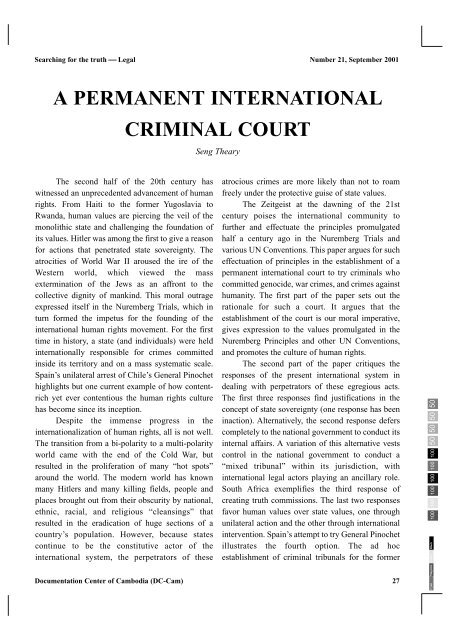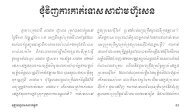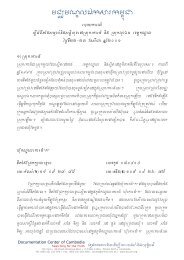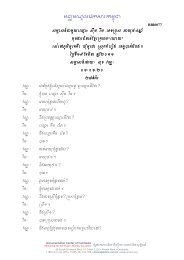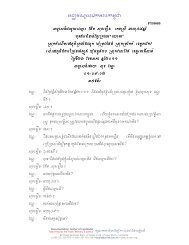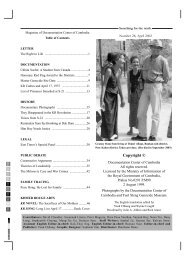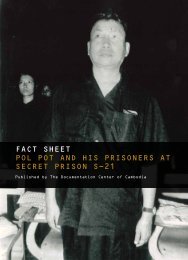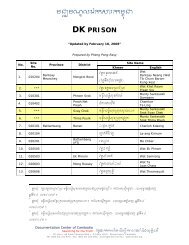Searching for the truth Issues 21 - Documentation Center of Cambodia
Searching for the truth Issues 21 - Documentation Center of Cambodia
Searching for the truth Issues 21 - Documentation Center of Cambodia
Create successful ePaper yourself
Turn your PDF publications into a flip-book with our unique Google optimized e-Paper software.
<strong>Searching</strong> <strong>for</strong> <strong>the</strong> <strong>truth</strong> ⎯ Legal<br />
<strong>Documentation</strong> <strong>Center</strong> <strong>of</strong> <strong>Cambodia</strong> (DC-Cam)<br />
Number <strong>21</strong>, September 2001<br />
A PERMANENT INTERNATIONAL<br />
The second half <strong>of</strong> <strong>the</strong> 20th century has<br />
witnessed an unprecedented advancement <strong>of</strong> human<br />
rights. From Haiti to <strong>the</strong> <strong>for</strong>mer Yugoslavia to<br />
Rwanda, human values are piercing <strong>the</strong> veil <strong>of</strong> <strong>the</strong><br />
monolithic state and challenging <strong>the</strong> foundation <strong>of</strong><br />
its values. Hitler was among <strong>the</strong> first to give a reason<br />
<strong>for</strong> actions that penetrated state sovereignty. The<br />
atrocities <strong>of</strong> World War II aroused <strong>the</strong> ire <strong>of</strong> <strong>the</strong><br />
Western world, which viewed <strong>the</strong> mass<br />
extermination <strong>of</strong> <strong>the</strong> Jews as an affront to <strong>the</strong><br />
collective dignity <strong>of</strong> mankind. This moral outrage<br />
expressed itself in <strong>the</strong> Nuremberg Trials, which in<br />
turn <strong>for</strong>med <strong>the</strong> impetus <strong>for</strong> <strong>the</strong> founding <strong>of</strong> <strong>the</strong><br />
international human rights movement. For <strong>the</strong> first<br />
time in history, a state (and individuals) were held<br />
internationally responsible <strong>for</strong> crimes committed<br />
inside its territory and on a mass systematic scale.<br />
Spain’s unilateral arrest <strong>of</strong> Chile’s General Pinochet<br />
highlights but one current example <strong>of</strong> how contentrich<br />
yet ever contentious <strong>the</strong> human rights culture<br />
has become since its inception.<br />
Despite <strong>the</strong> immense progress in <strong>the</strong><br />
internationalization <strong>of</strong> human rights, all is not well.<br />
The transition from a bi-polarity to a multi-polarity<br />
world came with <strong>the</strong> end <strong>of</strong> <strong>the</strong> Cold War, but<br />
resulted in <strong>the</strong> proliferation <strong>of</strong> many “hot spots”<br />
around <strong>the</strong> world. The modern world has known<br />
many Hitlers and many killing fields, people and<br />
places brought out from <strong>the</strong>ir obscurity by national,<br />
ethnic, racial, and religious “cleansings” that<br />
resulted in <strong>the</strong> eradication <strong>of</strong> huge sections <strong>of</strong> a<br />
country’s population. However, because states<br />
continue to be <strong>the</strong> constitutive actor <strong>of</strong> <strong>the</strong><br />
international system, <strong>the</strong> perpetrators <strong>of</strong> <strong>the</strong>se<br />
CRIMINAL COURT<br />
Seng Theary<br />
atrocious crimes are more likely than not to roam<br />
freely under <strong>the</strong> protective guise <strong>of</strong> state values.<br />
The Zeitgeist at <strong>the</strong> dawning <strong>of</strong> <strong>the</strong> <strong>21</strong>st<br />
century poises <strong>the</strong> international community to<br />
fur<strong>the</strong>r and effectuate <strong>the</strong> principles promulgated<br />
half a century ago in <strong>the</strong> Nuremberg Trials and<br />
various UN Conventions. This paper argues <strong>for</strong> such<br />
effectuation <strong>of</strong> principles in <strong>the</strong> establishment <strong>of</strong> a<br />
permanent international court to try criminals who<br />
committed genocide, war crimes, and crimes against<br />
humanity. The first part <strong>of</strong> <strong>the</strong> paper sets out <strong>the</strong><br />
rationale <strong>for</strong> such a court. It argues that <strong>the</strong><br />
establishment <strong>of</strong> <strong>the</strong> court is our moral imperative,<br />
gives expression to <strong>the</strong> values promulgated in <strong>the</strong><br />
Nuremberg Principles and o<strong>the</strong>r UN Conventions,<br />
and promotes <strong>the</strong> culture <strong>of</strong> human rights.<br />
The second part <strong>of</strong> <strong>the</strong> paper critiques <strong>the</strong><br />
responses <strong>of</strong> <strong>the</strong> present international system in<br />
dealing with perpetrators <strong>of</strong> <strong>the</strong>se egregious acts.<br />
The first three responses find justifications in <strong>the</strong><br />
concept <strong>of</strong> state sovereignty (one response has been<br />
inaction). Alternatively, <strong>the</strong> second response defers<br />
completely to <strong>the</strong> national government to conduct its<br />
internal affairs. A variation <strong>of</strong> this alternative vests<br />
control in <strong>the</strong> national government to conduct a<br />
“mixed tribunal” within its jurisdiction, with<br />
international legal actors playing an ancillary role.<br />
South Africa exemplifies <strong>the</strong> third response <strong>of</strong><br />
creating <strong>truth</strong> commissions. The last two responses<br />
favor human values over state values, one through<br />
unilateral action and <strong>the</strong> o<strong>the</strong>r through international<br />
intervention. Spain’s attempt to try General Pinochet<br />
illustrates <strong>the</strong> fourth option. The ad hoc<br />
establishment <strong>of</strong> criminal tribunals <strong>for</strong> <strong>the</strong> <strong>for</strong>mer<br />
27<br />
100 100 100 100 100 100 50 50 50 50<br />
Black<br />
Yellow<br />
Magenta<br />
Cyan


